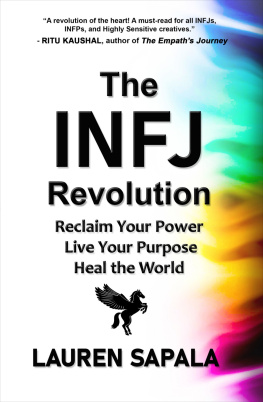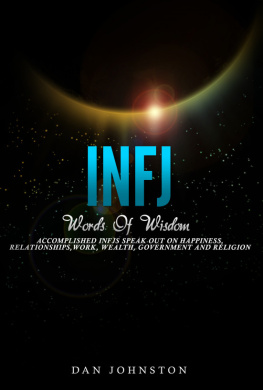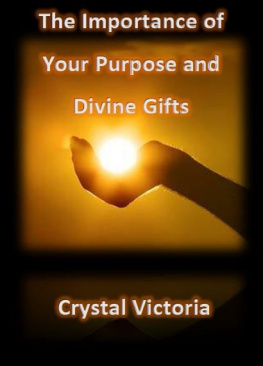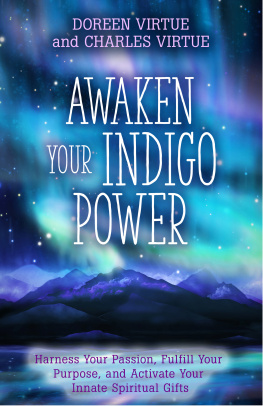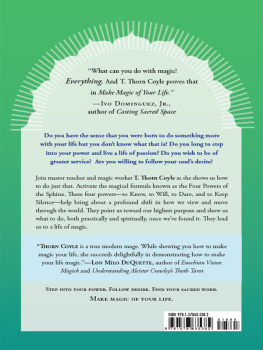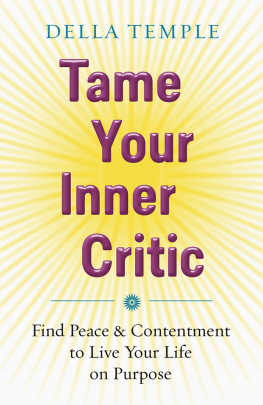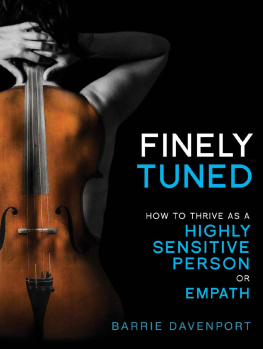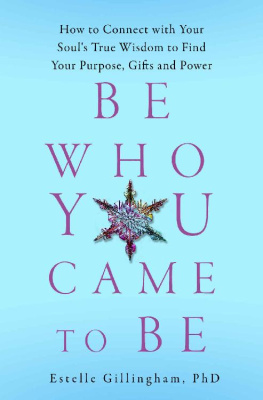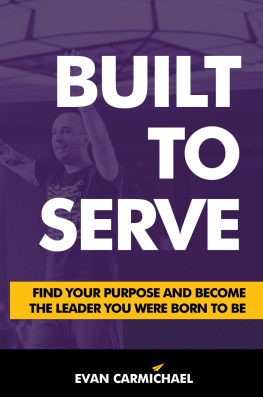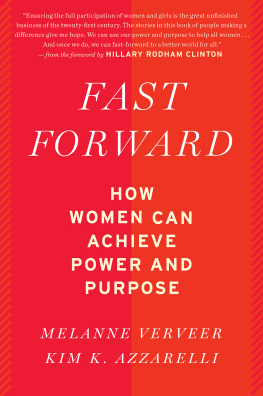The INFJ Revolution
Reclaim Your Power
Live Your Purpose
Heal the World
By Lauren Sapala
Copyright 2019 Lauren Sapala
All rights reserved. No part of this publication may be reproduced, stored in or introduced into a retrieval system, or transmitted in any form or by any means without the prior written consent of the copyright holder.
Copyright licensed by Lauren Sapala.
ISBN: 978-0-9988536-7-3
Cover artwork by John Price
Also by Lauren Sapala
Nonfiction
The INFJ Writer:
Cracking the Creative Genius of the Worlds Rarest Type
Firefly Magic:
Heart Powered Marketing for Highly Sensitive Writers
Fiction
Between the Shadow and Lo
(Book One of the West Coast Trilogy)
West Is San Francisco
(Book Two of the West Coast Trilogy)
Three years ago I wrote a little book called The INFJ Writer . I say little because thats honestly how it felt to me at the time. I got the idea for it and wrote the whole thing in a matter of months and I never conceived of it going out into the world as anything other than a simple writing guide for INFJ and INFP personality types.
But a funny thing happened after I published that book. I started getting messages from INFJs all over the world about how profoundly it touched them, and just about every message contained a personal story of how that person had struggled through life in one way or another before finding out they were an INFJ. After the discovery of their personality type, everything changed.
What didnt change, though, were the ongoing challenges that came with being an INFJ. In all the stories that people shared with me, the obstacles remained the same. The loneliness, the overwhelming sensitivity, the feeling of being a freak or an alien in a world that seemed to fit everyone except the INFJ. What also remained true for every INFJ was the deep calling they felt to find their life purpose and be of service to the world, if only they could conquer what was blocking them from moving forward in their lives.
As I received story after story from all these INFJs, I felt my own deep calling begin to grow. I knew I had to write another book for INFJs, one that wasnt just about writing or creativity, but that explored the more hidden problems, the darker feelings and dysfunctional patterns from which we all seemed to suffer. I knew, too, that I needed this book to show INFJs that things could change for us, that the world was already changing due to our newfound awareness of who we are and what we might be capable ofeven if that awareness and capability is only just now pushing out of the seed, breaking the soil, and tentatively reaching for the light.
This is a different kind of book for INFJs. You wont find much here on the basics of personality theory or any in-depth explanation of the INFJs function stack. Not only does it seem that most INFJs who find my books already know all that stuff anyway, but it can easily be found online with a quick search. This isnt a book that regurgitates everything that can be found through Google. Instead, this is a book of my own personal observations and theories about what it means to be an INFJ, how we invalidate and sabotage ourselves, and how we can stop. This is a book that talks about things like shamanism, Native American spirituality, and New Age philosophy. Its a book that, at its core, is built to shift the reader energetically by introducing new thought patterns and ways of seeing ourselves.
Its not a book for everyone.
But if youre an INFJ who wants to move up to the next level in your life, then it might be for you.
And if youre still with me, then lets begin.
INFJs and Power: Why We Give It Away
For most of my working life, I have worked in offices. And in almost every office, I had the lowest position on the totem pole: I was the office admin. Sometimes my title was office manager and sometimes it was executive assistant, which sounds better but really isnt because in a small office its basically the same thing. I always fell into this sort of job because it was easy for me. I had all the traits to be good at it, naturally. I was organized and efficient, as well as discreet and personable. And I had another trait, or maybe habit is a better word for it, that particularly suited being in a low-paid, underappreciated office position: I routinely gave my power away to other people.
In 2016 though, I started noticing something about my life. It felt poor. Not that I was poverty-stricken, but I was broke. And being broke seemed to be a constant condition for me. I was always having trouble meeting my financial obligations and always juggling credit card debt. I was always cutting off this or that relationship with someone because I felt they were taking advantage of me, or I had suddenly discovered they were an energy vampire who was sucking me dry. I was always struggling to say no to people, and all too often saying yes when I really didnt want to.
I started doing a lot of inner work around money, and abundance. What surprised me was that along with that work came an interest in power. For the first time in my life, it was a concept I was consciously thinking about, and something I knew I needed to delve into deeper. Power, to me, meant an oppressive force. Power was something I saw as smothering, controlling, manipulative, and sometimes, abusive. I got uncomfortable around power. I didnt even like talking about it. I didnt want anything to do with it. When it came near me, I wanted to get as far away as possible.
Because I was so uncomfortable with power, my own or anyone elses, whenever it showed up I quickly handed it off to someone else. And I was always reluctant to take it back.
As I dug further into my problems with power, I started digging up the past. I had hardly spoken in my first years of elementary school, and I had always been labeled as shy. When I did start talking more, the things I said were often weird, precocious, or made other people uncomfortable. I asked hard questions and waited patiently for honest answers. Sometimes people awkwardly changed the subject and sometimes they just outright told me I was weird and made fun of me.
I found out early on, as every INFJ and INFP does, that the things I likedthe things that I loved and lit me up insidewere not interesting to other people. In fact, a lot of the time other people found those things horrifying, gross, uncomfortable, or just deadly boring.
Also, I was an empath. So, when someone had that horrifying, gross, uncomfortable, or bored reaction, I felt it. I felt a tightening in my own chest when my questions made them anxious. I felt the urge to cry in my own body when I unwittingly triggered a hidden emotional reservoir in another. And when people got angry, even if it wasnt my fault and didnt involve me in any way whatsoever, I felt every jolt and surge of that adrenaline cocktail run through my own veins.
This made me avoid anything that involved negotiation, and there was nothing I hated more than flat-out confrontation.
Giving my power away from the start seemed to be my safest option. If I gave my power away right out of the gate no one would need to negotiate with me, or get into confrontations, or have any big, hot, messy emotions around me that would zap my system, make me ill, and then leave me reeling for the next few hours or days. As a young INFJ, constantly giving my power away was the best option I could give myself at the time.
But then, I grew up. And this strategy not only stopped working, it started poisoning my life and undermining me at every turn. Staying invisible meant that my natural creativity felt stifled and smothered. Avoiding confrontation meant that I frequently got walked on and used. Giving my power away on a constant basis meant that my batteries were always running low, and I had to constantly dig myself deeper in debtboth financially and energeticallyjust to break even.

